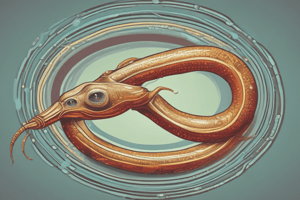Podcast
Questions and Answers
What is the primary organism responsible for schistosomiasis?
What is the primary organism responsible for schistosomiasis?
- Protozoans of the genus Plasmodium
- Cestodes of the genus Taenia
- Trematode worms of the genus Schistosoma (correct)
- Nematodes of the genus Ascaris
During which phase of schistosomiasis do cercariae penetrate and migrate through the skin?
During which phase of schistosomiasis do cercariae penetrate and migrate through the skin?
- Acute phase
- Migratory phase (correct)
- Infectious phase
- Chronic phase
What is the species of Schistosoma primarily responsible for causing urogenital issues?
What is the species of Schistosoma primarily responsible for causing urogenital issues?
- Schistosoma intercalatum
- Schistosoma mansoni
- Schistosoma haematobium (correct)
- Schistosoma japonicum
What stage of the Schistosoma life cycle is capable of infecting humans?
What stage of the Schistosoma life cycle is capable of infecting humans?
Where do adult Schistosoma worms that cause intestinal schistosomiasis primarily reside?
Where do adult Schistosoma worms that cause intestinal schistosomiasis primarily reside?
Which species of Schistosoma is associated with intestinal schistosomiasis?
Which species of Schistosoma is associated with intestinal schistosomiasis?
What are the typical clinical manifestations during the migratory phase of schistosomiasis?
What are the typical clinical manifestations during the migratory phase of schistosomiasis?
Which phase of schistosomiasis follows the migratory phase?
Which phase of schistosomiasis follows the migratory phase?
Which of the following symptoms is NOT associated with serum sickness due to immune complex formation?
Which of the following symptoms is NOT associated with serum sickness due to immune complex formation?
What is the recommended minimum age for individuals to receive annual preventive chemotherapy for Schistosomiasis?
What is the recommended minimum age for individuals to receive annual preventive chemotherapy for Schistosomiasis?
In which trimester is the administration of praziquantel contraindicated for pregnant women?
In which trimester is the administration of praziquantel contraindicated for pregnant women?
Which of the following is a symptom characteristic of Katayama syndrome?
Which of the following is a symptom characteristic of Katayama syndrome?
Which strategy is NOT recommended for the control and elimination of Schistosomiasis?
Which strategy is NOT recommended for the control and elimination of Schistosomiasis?
What happens to many of the eggs laid by female Schistosoma worms?
What happens to many of the eggs laid by female Schistosoma worms?
What is the preventive chemotherapy used in endemic areas with Schistosoma infection prevalence of 10% or greater?
What is the preventive chemotherapy used in endemic areas with Schistosoma infection prevalence of 10% or greater?
What is the proposed action if there is a lack of appropriate response to annual preventive chemotherapy in endemic areas?
What is the proposed action if there is a lack of appropriate response to annual preventive chemotherapy in endemic areas?
What is the primary complication associated with immune complex formation in hypersensitivity responses?
What is the primary complication associated with immune complex formation in hypersensitivity responses?
Which factor is NOT included in the control strategies for schistosomiasis?
Which factor is NOT included in the control strategies for schistosomiasis?
What symptom is characteristic of the acute infection phase when cercariae penetrate the skin?
What symptom is characteristic of the acute infection phase when cercariae penetrate the skin?
In endemic countries with Schistosoma infection prevalence of ≥10%, who should receive preventive chemotherapy?
In endemic countries with Schistosoma infection prevalence of ≥10%, who should receive preventive chemotherapy?
What is a key manifestation of Katayama syndrome that occurs several weeks after infection?
What is a key manifestation of Katayama syndrome that occurs several weeks after infection?
What action should be taken if annual preventive chemotherapy for Schistosoma spp. shows inadequate response?
What action should be taken if annual preventive chemotherapy for Schistosoma spp. shows inadequate response?
Which of the following is a potential consequence of eggs becoming trapped in organs due to immune responses?
Which of the following is a potential consequence of eggs becoming trapped in organs due to immune responses?
What is the recommended frequency of preventive chemotherapy in areas with Schistosoma prevalence and lack of adequate response?
What is the recommended frequency of preventive chemotherapy in areas with Schistosoma prevalence and lack of adequate response?
Which statement about the life cycle of Schistosoma is correct?
Which statement about the life cycle of Schistosoma is correct?
What is the primary location where adult Schistosoma worms responsible for urogenital schistosomiasis reside?
What is the primary location where adult Schistosoma worms responsible for urogenital schistosomiasis reside?
In which phase can sensitized patients experience transient dermatitis and potential pulmonary issues?
In which phase can sensitized patients experience transient dermatitis and potential pulmonary issues?
What is the correct sequence of internal migration for schistosomula after skin penetration?
What is the correct sequence of internal migration for schistosomula after skin penetration?
Which species of Schistosoma is not associated with intestinal schistosomiasis?
Which species of Schistosoma is not associated with intestinal schistosomiasis?
What primarily distinguishes the acute phase of schistosomiasis from the migratory phase?
What primarily distinguishes the acute phase of schistosomiasis from the migratory phase?
What type of approach is central to the public health strategy against schistosomiasis?
What type of approach is central to the public health strategy against schistosomiasis?
During which phase is schistosomiasis generally asymptomatic?
During which phase is schistosomiasis generally asymptomatic?
Study Notes
Parasitic Etiology of Schistosomiasis
- Schistosomiasis is caused by blood flukes (Trematode worms) of the genus Schistosoma.
Transmission of Schistosomiasis
- Infection occurs when humans or animals contaminate freshwater with excreta containing Schistosoma eggs, which hatch in water.
- The cercariae, a larval form, penetrate the skin during contact with infested water, leading to the development of adult schistosomes in the bloodstream.
- Current public health strategies focus on preventive chemotherapy to control and eliminate schistosomiasis.
Species of Schistosoma
- Intestinal schistosomiasis is caused by:
- S. japonicum
- S. mansoni
- S. mejonji
- S. guineensis
- S. intercalatum
- Urogenital schistosomiasis is primarily caused by S. haematobium.
Habitat of Adult Worms
- Adult intestinal schistosomes reside in blood vessels surrounding the intestines.
- Adult genitourinary schistosomes inhabit the urinary venous plexus.
Life Cycle Stages
- The initial free-swimming larval stage is called miracidia.
- The infective stage for humans is the cercariae.
- After penetration, schistosomula migrate to the lungs and then to the liver for maturation.
Phases of Schistosomiasis
- Three key phases are identified:
- Migratory phase
- Acute phase
- Chronic phase
Clinical Manifestations
- During the migratory phase, cercariae penetrate the skin, often asymptomatically, though sensitized individuals may experience transient dermatitis and respiratory symptoms.
- The acute phase can present hypersensitivity symptoms including:
- Serum sickness
- Pyrexia, fatigue, aches
- Lymphadenopathy
- Gastrointestinal discomfort, including pain and bloody diarrhea
- Katayama syndrome may occur, which is pathognomonic during this phase.
- Not all eggs laid by female schistosomes exit the host; many become trapped in tissues, leading to a granulomatous response.
Control and Elimination Strategies
- Strategies include:
- Preventive chemotherapy
- Provision of clean drinking water
- Improved sanitation and hygiene
- Education on disease prevention
- Control of snail populations
- Environmental modification
WHO Recommendations
- In endemic areas with prevalence ≥10%, WHO recommends annual preventive chemotherapy with a single dose of Praziquantel for:
- Individuals aged 2 years and older
- Adults, including pregnant women after the first trimester and lactating women.
- If there’s insufficient response to treatment despite adequate coverage, consider biannual preventive chemotherapy instead.
Specific Contraindications
- Praziquantel is contraindicated during the first trimester of pregnancy.
Notable Reactions
- Swimmer’s Itch refers to the acute infection reaction from cercariae skin penetration, potentially causing a rash.
- Katayama Syndrome is a systemic hypersensitivity reaction that occurs 3-8 weeks post-infection, caused by schistosome antigens and immune complex formation.
Parasitic Etiology of Schistosomiasis
- Schistosomiasis is caused by blood flukes (Trematode worms) of the genus Schistosoma.
Transmission of Schistosomiasis
- Infection occurs when humans or animals contaminate freshwater with excreta containing Schistosoma eggs, which hatch in water.
- The cercariae, a larval form, penetrate the skin during contact with infested water, leading to the development of adult schistosomes in the bloodstream.
- Current public health strategies focus on preventive chemotherapy to control and eliminate schistosomiasis.
Species of Schistosoma
- Intestinal schistosomiasis is caused by:
- S. japonicum
- S. mansoni
- S. mejonji
- S. guineensis
- S. intercalatum
- Urogenital schistosomiasis is primarily caused by S. haematobium.
Habitat of Adult Worms
- Adult intestinal schistosomes reside in blood vessels surrounding the intestines.
- Adult genitourinary schistosomes inhabit the urinary venous plexus.
Life Cycle Stages
- The initial free-swimming larval stage is called miracidia.
- The infective stage for humans is the cercariae.
- After penetration, schistosomula migrate to the lungs and then to the liver for maturation.
Phases of Schistosomiasis
- Three key phases are identified:
- Migratory phase
- Acute phase
- Chronic phase
Clinical Manifestations
- During the migratory phase, cercariae penetrate the skin, often asymptomatically, though sensitized individuals may experience transient dermatitis and respiratory symptoms.
- The acute phase can present hypersensitivity symptoms including:
- Serum sickness
- Pyrexia, fatigue, aches
- Lymphadenopathy
- Gastrointestinal discomfort, including pain and bloody diarrhea
- Katayama syndrome may occur, which is pathognomonic during this phase.
- Not all eggs laid by female schistosomes exit the host; many become trapped in tissues, leading to a granulomatous response.
Control and Elimination Strategies
- Strategies include:
- Preventive chemotherapy
- Provision of clean drinking water
- Improved sanitation and hygiene
- Education on disease prevention
- Control of snail populations
- Environmental modification
WHO Recommendations
- In endemic areas with prevalence ≥10%, WHO recommends annual preventive chemotherapy with a single dose of Praziquantel for:
- Individuals aged 2 years and older
- Adults, including pregnant women after the first trimester and lactating women.
- If there’s insufficient response to treatment despite adequate coverage, consider biannual preventive chemotherapy instead.
Specific Contraindications
- Praziquantel is contraindicated during the first trimester of pregnancy.
Notable Reactions
- Swimmer’s Itch refers to the acute infection reaction from cercariae skin penetration, potentially causing a rash.
- Katayama Syndrome is a systemic hypersensitivity reaction that occurs 3-8 weeks post-infection, caused by schistosome antigens and immune complex formation.
Studying That Suits You
Use AI to generate personalized quizzes and flashcards to suit your learning preferences.
Description
This quiz covers the etiology, transmission, and species of Schistosoma causing schistosomiasis. It includes details about the life cycle, infectious stages, and public health strategies for prevention. Test your knowledge about this parasitic disease and its impact on human health.




